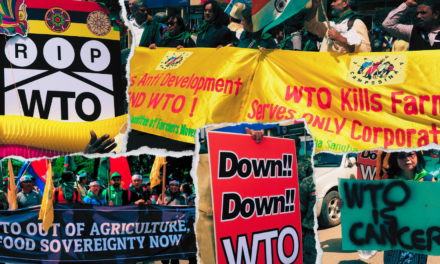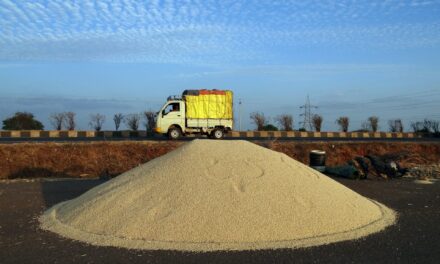The farmers started their travel to Bangalore from various districts in the state yesterday and gathered together in the Bangalore City railway station this morning. Carrying green flags, banners and signs, they then started their march through the city to the Mahatma Gandhi Park in the city centre for a daylong rally of songs, theatre and speeches. They were blocked en-route by the Bangalore City Police, who claimed that the park was not large enough to accommodate the full procession. But the farmers were not deterred and found their way across the barricades to the park through a variety of routes. Despite attempts by the city police to scatter the demonstrators, at least 15,000 farmers had already reached the park by early afternoon and more were still coming. The main issues raised in the rally were the impact of the WTO’s Agreement on Agriculture on small farmers in India and the Indian Government’s failure to protect its farmers from ruin and literally, death. Burdened by crop failures, low commodity prices and heavy debt burdens, at least 280 farmers have committed suicide in Karnataka from April to September. The entire gathering resolved that food is the right of every person and cannot be left to the whims or dictates of the market. “Farmers’ suicides and liberalisation are directly related,” said Professor Najundaswamy, a founder members and current President of the KRRS. “It all started in 1995. Before that we did not have these mass suicides in Karnataka and other states. The year 2000 was a record year in agriculture production since independence [1947], but there were suicides even in that year. The reason for this is liberalisation, which has resulted in falling prices, falling incomes and increasing debts.” According to Professor Nanjundaswamy, the KRRS asked the Government of India to not sign the agreement establishing the WTO as far back as 1992. In 1994, KRRS leaders met the leadership of all political parties and made the case for India to pull out of the WTO. “Atal Bihari Vajpayee was the leader of the opposition at that time and told me not worry so much and that India could always withdraw from the WTO with six months notice” he said. “Now we demand that India come out of the WTO, and in solidarity with other farmers’ movements across the world, we demand that food and agriculture be removed from the WTO.” According to Chandrashekhar, a farmer leader from Hassan District, the actual number of suicides in the state is likely to be much higher than officially reported figures: “Many suicides are not reported by families since they would then have to go through burdensome police procedures and pay bribes to get the paper-work completed. These suicides must be stopped.” H. M. Maheshwarswamy from Dawangiri District added that farmers need a range of supports from the government: “The Karnataka Government must provide free electricity to farmers for 18 hours a day. Farmers must get a fair price for their products. The government must set prices based on proper scientific study. All farmers’ debts, from private lenders and banks must be cancelled. This is the only way to stop the suicides in Karnataka.” Farmers at the rally identified the domination of the food and agriculture sector by Multinational Companies as a serious threat to local farmers. “Multi-national Companies must be driven out of India,” said Chandrashekhar. “So either agriculture must come out of the WTO, or India must come out of the WTO. Farmers will intensify this movement in the future.” Maheshwarswamy said that if the government does not remove foreign companies from the Indian agriculture sector, “…we will use all the means possible to throw them out.” Farmers at the rally also linked the impacts of trade liberalisation to other sectors. In the words of H.S. Masti from Bagalkot District, “Imported goods will be sold at very low prices and our own producers will be made useless. It is not only small farmers, but also other producers in our villages such as carpenters and goldsmiths who will be affected by cheap imports. In our villages these producers depend on the farmers for their livelihood and will also die if farmers die. If we cannot feed ourselves, how can we feed others?” Mr. Masti also spoke about the multiplying effects of agriculture inputs and genetically modified plant varieties to local food and environmental quality. “Because of inputs like Round-up, dangerous contaminants are getting into our soil and entire food system. And no matter what inputs we use, our food still does not meet international standards. BT corn and BT cotton have been introduced into our environment. Our cattle cannot eat BT corn and animals that feed in the area where BT cotton is planted have died. We do not want such a system.” The expanding ambit of the WTO in food and agriculture is a serious cause for concern among farmer movements in other states as well. According to K. Sellamuthu from the Tamil Nadu Farmers’ Association, oilseeds (groundnut, sunflower, gingelly and coconut) currently fetch average prices from Rs. 35-50 per litre. In compliance with WTO requirements, India has agreed to import palm oil from Malaysia, which will sell at Rs. 10 per litre. This will devastate local oilseed producers. Similarly, the current market price of wheat is Rs. 13 per kg, but in compliance with WTO requirements, wheat from the United States (US) will enter Indian markets at Rs. 4 per kg. “The style of production in the US is different from India. They farm large tracts of land with mechanised technology. In India, we have zero agriculture subsidies and farmers are already committing suicide; the agriculture sector itself is committing suicide. Seventy crores of people [seven hundred million] will be impacted by the WTO, all directly in the agriculture sector. Arun Jaitly has also said this, but whether the Indian Government will uphold this in Cancun or agree to quit the WTO is not certain. Based on the results of Cancun, we will make further plans for future actions.” Mr. Sellamuthu added, “In rural areas, 80 out of 100 children still go to school without chappals [slippers]. Bringing food and agriculture under the WTO’s web will not work for developing countries like India.” The rally today was not an isolated or one-off event. Since 1992, farmers’ movements in India have staged unified protests against the Dunkel Draft and the establishment of the WTO, which marked the inclusion of agriculture into the WTO. Since the launch of the current negotiations under the Doha work programme, farmer and fisher movements across the developing and developed world have joined hands and demanded that liberalisation of the agriculture sector be halted, and that governments prioritise the needs of their small, family- based agriculture producers over the interests of middle-men, agri- business companies and trans-national food companies. A significant worry for peasant and artisanal fisher movements in developing countries is that their governments will trade agriculture away for concessions in other sectors such as services, foreign direct investment and industry. The farmers at the rally were well aware of India’s negotiating position in the Cancun Ministerial meeting, but were not confident that the Indian Government will meet the challenge to protect them from the onslaught of further trade liberalisation. Women in the gathering were familiar with the rules of the GATT/WTO and what an expansion of these rules means for their future. In the words of one of the speakers, “Since independence, the farmers who have provided rice for this country are committing suicide and our government is responsible for this. Jaitly is speaking some sense now in the WTO. But we have to send a strong message to him that he does not change his position in Cancun under pressure from delegates from certain other countries. Vajpayee must get the same message.” The farmers of Karnataka have sent their message. But are Arun Jaitly and Atal Bihari Vajpayee listening?








